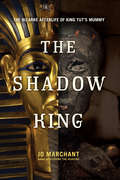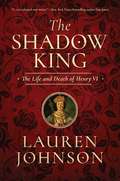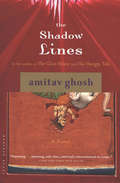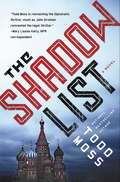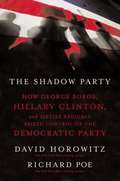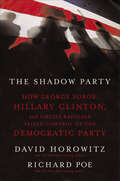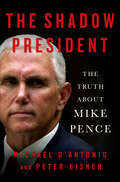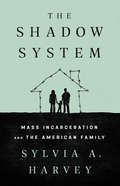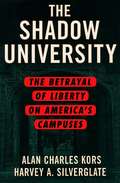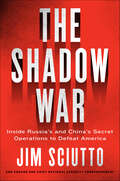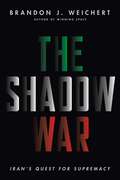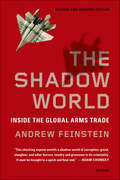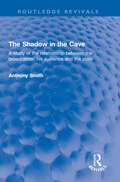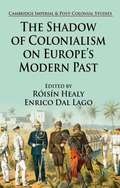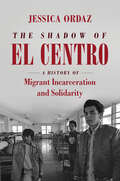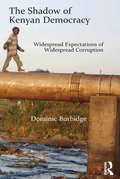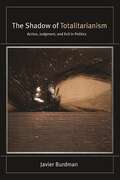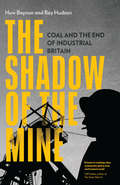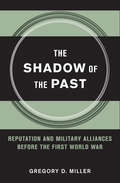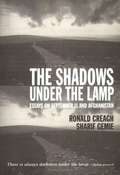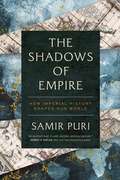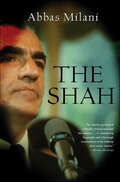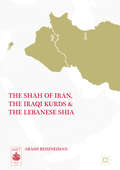- Table View
- List View
The Shadow King: The Bizarre Afterlife of King Tut's Mummy
by Jo MarchantMore than 3,000 years ago, King Tutankhamun's desiccated body was lovingly wrapped and sent into the future as an immortal god. After resting undisturbed for more than three millennia, King Tut's mummy was suddenly awakened in 1922. Archaeologist Howard Carter had discovered the boy-king's tomb, and the soon-to-be famous mummy's story--even more dramatic than King Tut's life--began.The mummy's "afterlife" is a modern story, not an ancient one. Award-winning science writer Jo Marchant traces the mummy's story from its first brutal autopsy in 1925 to the most recent arguments over its DNA. From the glamorous treasure hunts of the 1920s to today's high-tech scans in volatile modern Egypt, Marchant introduces us to the brilliant and sometimes flawed people who have devoted their lives to revealing the mummy's secrets, unravels the truth behind the hyped-up TV documentaries, and explains what science can and can't tell us about King Tutankhamun.
The Shadow King: The Life And Death Of Henry Vi
by Lauren JohnsonA thrilling new account of the tragic story and troubled times of Henry VI, who inherited the crowns of both England and France and lost both. Firstborn son of a warrior father who defeated the French at Agin- court, Henry VI of the House of Lancaster inherited the crown not only of England but also of France, at a time when Plantagenet dominance over the Valois dynasty was at its glorious height. And yet, by the time he died in the Tower of London in 1471, France was lost, his throne had been seized by his rival, Edward IV of the House of York, and his kingdom had descended into the violent chaos of the Wars of the Roses. Henry VI is perhaps the most troubled of English monarchs, a pious, gentle, well-intentioned man who was plagued by bouts of mental illness. In The Shadow King, Lauren Johnson tells his remark- able and sometimes shocking story in a fast-paced and colorful narrative that captures both the poignancy of Henry’s life and the tumultuous and bloody nature of the times in which he lived.
The Shadow Lines: A Novel (King Penguin Ser.)
by Amitav Ghosh&“A stunning novel&” following two families—one British, one Bengali—from the New York Times–bestselling author of Sea of Poppies (The New Republic). Opening in Calcutta in the 1960s, Amitav Ghosh&’s radiant second novel follows an English family and a Bengali family as their lives intertwine across the generations in both tragic and comic ways. The narrator, Indian born and English educated, traces events back and forth in time, from the outbreak of World War II to the late twentieth century, through years of Bengali partition and violence—observing the ways in which political events invade private lives—in an &“ambitious, funny, poignant&” saga (A. K. Ramanujan). &“Amusing, sad, wise, and truly international in scope.&” —The New York Times Book Review
The Shadow List
by Todd MossA cutting-edge novel of international crime and its consequences, from Nigeria to Russia to Washington, from the former deputy assistant secretary of state. We laugh when it pops up in our inbox: the scam letter promising a windfall. We wonder: How does anybody fall for these things? But it is no laughing matter. It is one of the biggest organized crime rackets in the world, it is deadly - and State Department crisis manager Judd Ryker has fallen right into the middle of it.The disappearance of a young American in London sends Ryker into the heart of a corruption scandal in Nigeria, at the same time his CIA agent wife Jessica finds herself chasing a Russian master criminal known as the Bear. Unknown to either of them, they are pulling at two ends of the same lethal thread, a staggeringly vicious enterprise of piracy, extortion, and murder.The world is messy and dangerous, Jessica warns her husband.More dangerous than you know. But he is about to find out.
The Shadow Party: How George Soros, Hillary Clinton, and Sixties Radicals Seized Control of the Democratic Party
by David Horowitz Richard PoeAmerica is under attack. Its institutions and values are under daily assault. But the principal culprits are not foreign terrorists. They are influential and powerful Americans secretly stirring up disunion and disloyalty in the shifting shadows of the Democratic Party. New York Times best-selling authors David Horowitz and Richard Poe (both former radicals) weave together riveting history, investigative reporting, and cutting political analysis to help expose and explain: The Shadow Party's plan to rewrite the US Constitution. How the Shadow Party overthrows foreign governments - and why it may attempt to use the same methods here. The vast network of private think tanks, foundations, unions, stealth PACs, and other front groups through which the Shadow Party operates in America. The network's voluminous contributions to the Democrats, which totaled more than $300 million in the 2004 elections, and its growing influence over the party's message and policy. The politicians on both sides of the aisle who have exchanged political favors with George Soros and his "government-in-the-wings. " The Shadow Party's efforts to conceal its radical agenda behind the "moderate" pose of Hillary Clinton and other public figures. The radical network's plan to seize power in 2008.
The Shadow Party: How George Soros, Hillary Clinton, and Sixties Radicals Seized Control of the Democratic Party
by David Horowitz Richard PoeAmerica is under attack. Its institutions and values are under daily assault. But the principal culprits are not foreign terrorists. They are influential and powerful Americans secretly stirring up disunion and disloyalty in the shifting shadows of the Democratic Party.Radical infiltrators have been quietly transforming America's societal, cultural, and political institutions for more than a generation. Now, backed by George Soros, they are ready to make their move. These "progressive" extremists have gained control over a once-respectable but now desperate and dangerous political party. From their perches in the Democratic hierarchy, they seek to undermine the war on terror, destabilize the nation, and effect radical "regime change" in America.With startling new evidence, New York Times best-selling authors David Horowitz and Richard Poe shine the light on the Shadow Party, exposing its methods, tactics, and ultimate agenda.
The Shadow President: The Truth About Mike Pence
by Michael D'Antonio Peter Eisner"It presents an entirely damning portrait of Pence. You've seen his colors before, but not so vividly and in this detail." —Frank Bruni, The New York Times"Producing a biography of a living, controversial politician is always difficult. D'Antonio and Eisner have succeeded in this well-documented, damning book. Cue the outrage from Sean Hannity et al."—Kirkus Reviews (starred review)In this well-rounded, deeply-investigated biography, the first full look at the vice president, two award-winning journalists unmask the real Mike Pence. Little-known outside his home state until Donald Trump made him his running mate, Mike Pence—who proclaims himself a Christian first, a conservative second, and a Republican third—has long worn a carefully-constructed mask of Midwestern nice. Behind his self-proclaimed humility and self-abasing deference, however, hides a man whose own presidential ambitions have blazed since high school. Pence’s drive for power, perhaps inspired by his belief that God might have big plans for him, explains why he shocked his allies by lending Christian credibility to a scandal-plagued candidate like Trump.In this landmark biography, Pulitzer Prize-winner Michael D’Antonio and Emmy-nominated journalist Peter Eisner follow the path Pence followed from Catholic Democrat to conservative evangelical Republican. They reveal how he used his time as rightwing radio star to build connections with powerful donors; how he was a lackluster lawmaker in Congress but a prodigious fundraiser from the GOP’s billionaire benefactors; and how, once he locked in his views on the issues—anti-gay, pro-gun, anti-abortion, pro big-business—he became laser-focused on his own pursuit of power.As THE SHADOW PRESIDENT reveals, Mike Pence is the most important and powerful Christian Right politician America has ever seen. Driven as much by theology as personal ambition, Pence is now positioned to seize the big prize—the presidency—and use it to fashion a nation more pleasing to his god and corporate sponsors.
The Shadow System: Mass Incarceration and the American Family
by Sylvia A. HarveyFrom an award-winning journalist, a searing exposé of the effects of the mass incarceration crisis on families -- including the 2.7 million American children who have a parent locked up.In The Shadow System, award-winning journalist Sylvia A. Harvey follows the fears, challenges, and small victories of three families struggling to live within the confines of a brutal system. In Florida, a young father tries to maintain a relationship with his daughter despite a sentence of life without parole. In Kentucky, where the opioid epidemic has led to the increased incarceration of women, many of whom are white, one mother fights for custody of her children. In Mississippi, a wife steels herself for her husband's thirty-ninth year in prison and does her best to keep their sons close.Through these stories, Harvey reveals a shadow system of laws and regulations enacted to dehumanize the incarcerated and profit off their families -- from mandatory sentencing laws, to restrictions on prison visitation, to astronomical charges for brief phone calls.The Shadow System is an eye-opening account of the way incarceration has impacted generations of American families; it delivers a galvanizing clarion call to fix this broken system.
The Shadow University
by Alan Charles Kors Harvey SilverglateUniversities once believed themselves to be sacred enclaves, where students and professors could debate the issues of the day and arrive at a better understanding of the human condition. Today, sadly, this ideal of the university is being quietly betrayed from within. Universities still set themselves apart from American society, but now they do so by enforcing their own politically correct worldview through censorship, double standards, and a judicial system without due process. Faculty and students who threaten the prevailing norms may be forced to undergo "thought reform." In a surreptitious aboutface, universities have become the enemy of a free society, and the time has come to hold these institutions to account. The Shadow University is a stinging indictment of the covert system of justice on college campuses, exposing the widespread reliance on kangaroo courts and arbitrary punishment to coerce students and faculty into conformity. Alan Charles Kors and Harvey A. Silverglate, staunch civil libertarians and active defenders of free inquiry on campus, lay bare the totalitarian mindset that undergirds speech codes, conduct codes, and "campus life" bureaucracies, through which a cadre of deans and counselors indoctrinate students and faculty in an ideology that favors group rights over individual rights, sacrificing free speech and academic freedom to spare the sensitivities of currently favored groups. From Maine to California, at public and private universities alike, liberty and fairness are the first casualties as teachers and students find themselves in the dock, presumed guilty until proven innocent and often forbidden to cross-examine their accusers. Kors and Silverglate introduce us to many of those who have firsthand experience of the shadow university, including: The student at the center of the 1993 "Water Buffalo" case at the University of Pennsylvania, who was brought up on charges of racial harassment after calling a group of rowdy students "water buffalo" -- even though the term has no racial connotations. The Catholic residence adviser who was fired for refusing, on grounds of religious conscience, to wear a symbol of gay and lesbian causes. The professor who was investigated for sexual harassment when he disagreed with campus feminists about curriculum issues. The student who was punished for laughing at a statement deemed offensive to others and who was ordered to undergo "sensitivity training" as a result. The Shadow University unmasks a chilling reality for parents who entrust their sons and daughters to the authority of such institutions, for thinking people who recognize that vigorous debate is the only sure path to truth, and for all Americans who realize that when even one citizen is deprived of liberty, we are all diminished.
The Shadow War: Inside Russia's and China's Secret Operations to Defeat America
by Jim SciuttoAre we losing a war few of us realize we’re fighting? Jim Sciutto, CNN’s Chief National Security Correspondent, reveals the invisible fronts that make up 21st century warfare, from disinformation campaigns to advanced satellite weapons.Poisoned dissidents. Election interference. Armed invasions. International treaties thrown into chaos. Secret military buildups. Hackers and viruses. Weapons deployed in space. China and Russia (and Iran and North Korea) spark news stories by carrying out bold acts of aggression and violating international laws and norms. Isn’t this just bad actors acting badly?That kind of thinking is outdated and dangerous. Emboldened by their successes, these countries are, in fact, waging a brazen, global war on the US and the West. This is a new Cold War, which will not be won by those who fail to realize they are fighting it. The enemies of the West understand that while they are unlikely to win a shooting war, they have another path to victory. And what we see as our greatest strengths—open societies, military innovation, dominance of technology on Earth and in space, longstanding leadership in global institutions—these countries are undermining or turning into weaknesses.In The Shadow War,CNN anchor and chief national security correspondent Jim Sciutto provides us with a revealing and at times disturbing guide to this new international conflict. This Shadow War is already the greatest threat to America’s national security, even though most Americans know little or nothing about it. With on-the-ground reporting from Ukraine to the South China Sea, from a sub under the Arctic to unprecedented access to America’s Space Command, Sciutto draws on his deep knowledge, high-level contacts, and personal experience as a journalist and diplomat to paint the most comprehensive and vivid picture of a nation targeted by a new and disturbing brand of warfare.Thankfully, America is adapting and fighting back. In The Shadow War, Sciutto introduces readers to the dizzying array of soldiers, sailors, submariners and their commanders, space engineers, computer scientists, civilians, and senior intelligence officials who are on the front lines of this new kind of forever war. Intensive and disturbing, this invaluable and important work opens our eyes and makes clear that the war of the future is already here.
The Shadow War: Iran's Quest for Supremacy
by Brandon J. WeichertIs peace with the Islamic Republic of Iran possible?There has been an ongoing shadow war between the West and Iran, one that could explode and plunge the world into a third world war. The Biden Administration's move to make peace at any cost with the mad mullahs of Iran may be the very spark for a regional war that turns into a global conflict, the likes of which not seen since the 1940s. As the Biden Administration pines for a return to the ill-fated Iran nuclear deal, Tehran makes ready to consolidate its growing power in the Middle East at America's expense. For the last decade, Iran has consistently expanded its own reach and influence across the region—all while judiciously building up its military capabilities. As America looks for a way out of the Middle East and a return to the Obama-era nuclear agreement, Iran enhances the ability of its terrorist proxies, like Hezbollah in Lebanon or the Houthis in Yemen, to threaten the security of Israel and to destabilize the Saudi regime. Each time the Biden Administration signals its willingness to negotiate with Iran, Iran gets more aggressive. In the words of one Saudi official, Iran is a "paper tiger with steel claws." These steel claws have extended to encompass the whole region, and they include Iran's growing arsenal of complex drones, precision-guided munitions, EMP weapons, and their nuclear weapons arsenal. Thankfully, there is a path forward for the United States and the solution can be found in the policies outlined by the previous Trump Administration; in the form of the Abraham Accords and daring "maximum pressure" campaign against Iran. But time is not on America's side. Should President Biden continue down the destructive, illusory path to "peace" with Iran, he will not only have abandoned America's long-standing allies, but he will have also helped to trigger the very conflict he seeks to avoid. After all, as Ronald Reagan once quipped, world wars do not start "because America is too strong." They start because the United States is deemed too weak by its rivals. In The Shadow War: Iran's Quest for Supremacy, author Brandon Weichert explores how the next world war is unfolding right before our eyes and explains how the American government can avoid it while maintaining its position of strength and support for its allies.
The Shadow World: Inside the Global Arms Trade
by Andrew FeinsteinThe Shadow World presents the behind-the-scenes tale of the global arms trade, exposing in forensic detail the deadly collusion that too often exists among senior politicians, weapons manufacturers, felonious arms dealers, and the military--a situation that compromises our security and undermines our democracy. Now a major PBS documentary "An authoritative guide to the business of war. Chilling, heartbreaking, and enraging."--Arundhati Roy Andrew Feinstein reveals the cover-ups behind a range of weapons deals, from the largest in history--between the British and Saudi governments---to the guns-for-diamonds deals in Africa and the current $60 billion U.S. weapons contract with Saudi Arabia. Based on pathbreaking reporting and unprecedented access to top-secret information, The Shadow World takes us into a clandestine realm that is as vitally important as it is shocking.
The Shadow in the Cave: A study of the relationship between the broadcaster, his audience and the state (Routledge Revivals)
by Anthony SmithFirst published in 1973, The Shadow in the Cave explores the history of broadcasting conflicts and shows how they are built into the very roots of broadcasting. Every nation has built into its radio and television system a coded version of anxieties about the nature and effects of mass communication. The whole of the culture of broadcasting- its genres and its style – is an expression of the dilemmas which have bedevilled broadcasting form the moment of its invention. Anthony Smith’s book provides for the first time a connected and carefully researched picture of the real issues involved in the debate about broadcasting. This book shows how the argument about levels of taste in broadcasting, about balance and fairness, about trivialisation, control and freedom of access are elements of a gigantic problem which threatens the whole structure of democratic freedom. The book shows some of the path to be taken if broadcasting is not to undermine the basic notion of freedom of expression. Topical, subtle and revealing, this is an important historical document, a must read for scholars and researchers of media studies, news media, media history, mass communication and political studies.
The Shadow of Colonialism on Europe’s Modern Past (Cambridge Imperial and Post-Colonial Studies Series)
by Róisín HealyThrough a range of case studies from eastern and western Europe, this book breaks new ground in investigating the extent to which European peoples living within Europe were also subjected to the ideologies and practices of colonialism.
The Shadow of El Centro: A History of Migrant Incarceration and Solidarity (Justice, Power, and Politics)
by Jessica OrdazBounded by desert and mountains, El Centro, California, is isolated and difficult to reach. However, its location close to the border between San Diego and Yuma, Arizona, has made it an important place for Mexican migrants attracted to the valley's agricultural economy. In 1945, it also became home to the El Centro Immigration Detention Camp. The Shadow of El Centro tells the story of how that camp evolved into the Immigration and Customs Enforcement Service Processing Center of the 2000s and became a national model for detaining migrants—a place where the policing of migration, the racialization of labor, and detainee resistance coalesced.Using government correspondence, photographs, oral histories, and private documents, Jessica Ordaz reveals the rise and transformation of migrant detention through this groundbreaking history of one detention camp. The story shows how the U.S. detention system was built to extract labor, to discipline, and to control migration, and it helps us understand the long and shadowy history of how immigration officials went from detaining a few thousand unauthorized migrants during the 1940s to confining hundreds of thousands of people by the end of the twentieth century. Ordaz also uncovers how these detained migrants have worked together to create transnational solidarities and innovative forms of resistance.
The Shadow of Kenyan Democracy: Widespread Expectations of Widespread Corruption
by Dominic BurbidgeWhy has democracy failed to reduce corruption in Kenya? Framing the challenge in game theoretical terms, Dominic Burbidge examines how mutual expectations between citizens dictate the success or failure of political reforms. Since 1992, Kenya has conducted multiparty elections with the hope of promoting accountability and transparency in government. This is being undermined by ongoing corruption and an increasingly centralised state response to terrorism. Providing a nuanced assessment of democracy’s difficult road in Kenya, Burbidge discusses the independent role being played by widespread social expectations of corruption. Through tracking average views of the average person, it is possible to identify a threshold beyond which society suffers mutually reinforcing negative social expectations. This trend is the shadow of Kenyan democracy, and must be treated as a policy challenge on its own terms before institutional reforms will be successful.
The Shadow of Totalitarianism: Action, Judgment, and Evil in Politics (SUNY series, Intersections: Philosophy and Critical Theory)
by Javier BurdmanThe Shadow of Totalitarianism develops a new way to think about the problem of evil in politics. Beginning with the commonplace idea that the rise of totalitarianism in the twentieth century marked the emergence of a new form of evil, Javier Burdman finds early seeds of thinking about this form in Immanuel Kant's moral philosophy. Far from being an isolated object of inquiry, evil, Burdman argues, has long shaped and been central to philosophical understandings of political action and judgment. Systematically analyzing the relationship between evil, action, and judgment in the work of Kant, Hannah Arendt, and Jean-François Lyotard, The Shadow of Totalitarianism aligns evil in politics with a desire for moral certainty, hence the emphasis on the need to accept and affirm uncertainty in current ethical theories. The careful philosophical analysis through which Burdman develops this inquiry contributes to a better understanding of some of the theoretical complexities involved in the problem of evil and provides conceptual tools with which to approach it.
The Shadow of the Mine: Coal and the End of Industrial Britain
by Ray Hudson Huw BeynonThe rise and fall of Britain's most important industryNo one personified the age of industry more than the miners. The Shadow of the Mine tells the story of King Coal in its heyday - and what happened to mining communities after the last pits closed.Coal was central to the British economy, powering its factories and railways. It carried political weight, too. In the eighties the miners risked everything in a year-long strike against Thatcher's shutdowns. Defeat foretold the death of their industry. Tens of thousands were cast onto the labour market with a minimum amount of advice and support.Yet British politics all of a sudden revolves around the coalfield constituencies that lent their votes to Boris Johnson's Conservatives in 2019. Even in the Welsh Valleys, where the 'red wall' still stands, support for the Labour Party has halved in a generation. Huw Beynon and Ray Hudson draw on decades of research to chronicle these momentous changes through the words of the people who lived through them.
The Shadow of the Past: Reputation and Military Alliances before the First World War (Cornell Studies in Security Affairs)
by Gregory D. MillerIn The Shadow of the Past, Gregory D. Miller examines the role that reputation plays in international politics, emphasizing the importance of reliability—confidence that, based on past political actions, a country will make good on its promises—in the formation of military alliances. Challenging recent scholarship that focuses on the importance of credibility—a state’s reputation for following through on its threats—Miller finds that reliable states have much greater freedom in forming alliances than those that invest resources in building military force but then use it inconsistently. To explore the formation and maintenance of alliances based on reputation, Miller draws on insights from both political science and business theory to track the evolution of great power relations before the First World War. He starts with the British decision to abandon "splendid isolation" in 1900 and examines three crises—the First Moroccan Crisis (1905–6), the Bosnia-Herzegovina Crisis (1908–9), and the Agadir Crisis (1911)—leading up to the war. He determines that states with a reputation for being a reliable ally have an easier time finding other reliable allies, and have greater autonomy within their alliances, than do states with a reputation for unreliability. Further, a history of reliability carries long-term benefits, as states tend not to lose allies even when their reputation declines.
The Shadow of the Winter Palace: Russia's Drift to Revolution 1825-1917
by Edward CrankshawA panoramic, illuminating account of a dynasty in decline, that shows how Russia had within it seeds not only of revolution but of many aspects of modern Russia which we think of as peculiar.
The Shadows Under the Lamp: Essays on September 11 and Afghanistan
by Ronald Creagh Sharif GemieThis book discusses the history and culture of Afghanistan in the context of the post-September 11 world.
The Shadows of Empire: How Imperial History Shapes Our World
by Samir PuriA masterful, thought-provoking, and wide-ranging study of how the vestiges of the imperial era shape society today.In this groundbreaking narrative, The Shadows of Empire explains (in the vein of The Silk Roads and Prisoners of Geography) how the world&’s imperial legacies still shape our lives—as well as the thorniest issues we face today. For the first time in millennia we live without formal empires. But that doesn&’t mean we don&’t feel their presence rumbling through history. From Russia&’s incursions in the Ukraine to Brexit; from Trump&’s America-First policy to China&’s forays into Africa; from Modi&’s India to the hotbed of the Middle East, Samir Puri provides a bold new framework for understanding the world&’s complex rivalries and politics. Organized by region, and covering vital topics such as security, foreign policy, national politics and commerce, The Shadows of Empire combines gripping history and astute analysis to explain why the history of empire affects us all in profound ways; it is also a plea for greater awareness, both as individuals and as nations, of how our varied imperial pasts have contributed to why we see the world in such different ways.
The Shah
by Abbas MilaniThe definitive biography of the last Shah of Iran, tracing his dramatic rise and fall and his role in the creation of the contemporary Islamic Republic. Though his monarchy was toppled in 1979 and he died in 1980, the life of Mohammad-Reza Shah Pahlevi, the last Shah of Iran, continues to resonate today. Here, internationally respected author Abbas Milani gives us the definitive biography, more than ten years in the making, of the monarch who shaped Iran's modern age and with it the contemporary politics of the Middle East.The Shah's was a life filled with contradiction—as a social reformer he built schools, increased equality for women, and greatly reduced the power of the Shia clergy. He made Iran a global power, courting Western leaders from Churchill to Carter, and nationalized his country's many natural resources. But he was deeply conflicted and insecure in his powerful role. Intolerant of political dissent, he was eventually overthrown by the very people whose loyalty he so desperately sought. This comprehensive and gripping account shows us how Iran went from politically moderate monarchy to totalitarian Islamic republic. Milani reveals the complex and sweeping road that would bring the U.S. and Iran to where they are today.
The Shah of Iran, the Iraqi Kurds, and the Lebanese Shia (Middle East Today)
by Arash ReisinezhadThis book sheds new light on the emergence and fluctuation of Iran’s connections with non-state entities in the Middle East. Iran’s involvement with political-militant non-states has been at the heart of international and regional security policy for more than three decades. The author analyzes Iran’s non-state foreign policy by focusing on specific geopolitical and geocultural threats and opportunities that pushed Tehran to build strategic ties with the Iraqi Kurds and the Lebanese Shia. This project will appeal to multiple audiences interested in geopolitics of the Middle East, Iran's foreign policy, and international relations.
The Shah's Last Ride: The True Story of the Emperor's Dreams and Illusions, Exile and Death at the Hands of His Foes and Friends
by William ShawcrossBiography of the last few years of the Shah's reign.
